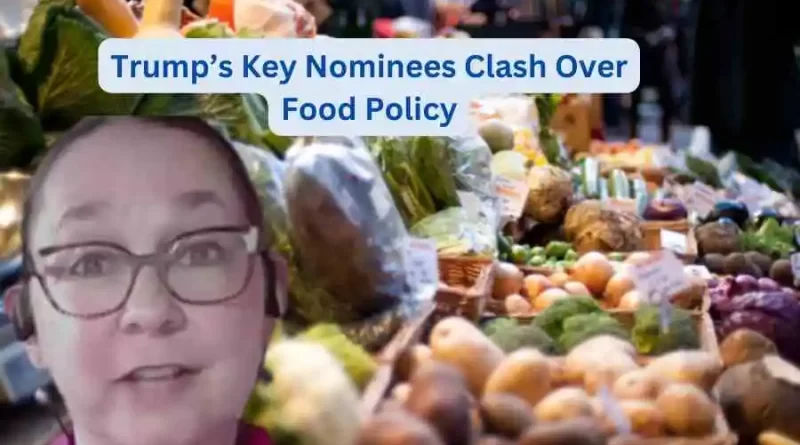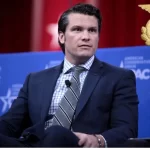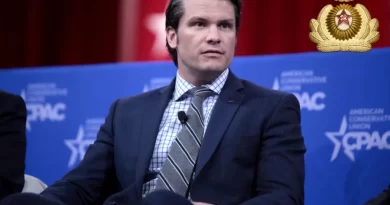Trump’s Key Nominees Clash Over Food Policy
President Trump likely to go for regulatory rollbacks: Building a healthier America once again?
US presidential nominees might find themselves at loggerheads due to their divergent backgrounds when it comes to deciding about the country’s food policy. Some of them are yet to pass the Senate confirmation hearings and inconsistencies are likely to come up while executing tasks.
The divergent opinions of the team members from the health department over the Food Policy, come with contradictions of every sort. And that is nothing new, especially in matters pertaining to immigrant visas or tariffs, food and agriculture are not thus, the exceptions. Therefore, there are concerns regarding the kind of shape, the policies on agriculture and mass deportations might take in Trump’s second term.
Loyalties to Trump apart, food policy researchers are of the opinion that there is a certain willingness on the part of the President’s inner circle toward deregulation. US citizens’ health certainly being a priority apart from the issues above!
Philip Kahn-Pauli, director of legislative affairs at the Center for Science in the Public Interest, says, “I would not be surprised to see industry interests ultimately beating out any more recent rhetoric around commitments to health.”
He said further, “One of the bigger things that are keeping me up at night is that we’ll continue to see trust in science come under attack, we’ll see misinformation and disinformation about nutrition and health proliferate and possibly even be platformed by government agencies, and that we’ll continue to see corporations benefiting at the expense of consumers.”
The variegated pickings in the health department are encouraging every sort of concern about the final picture. For instance, before Trump selected Robert F Kennedy Jr as Secretary of Health and Human Services, the USP of the President’s campaigns revolved around Kennedy’s criticism of ultra-processed foods and big food companies.
In August 2024, when Kennedy suspended his campaign for the US Presidency, he vowed to support Trump. At that time, Kennedy went ahead with his promises about making America healthy again. Before choosing Kennedy as his health minister, Susie Wiles was picked up for the post of senior official in his administration.
Wiles has been a lobbyist for a long and her acquaintance list includes the names of those food companies which have been criticized by Kennedy. The companies were criticized by Kennedy for introducing ultra-processed foods into the daily lives of US citizens. A completely contrasting image presented itself while they stood side by side, beside the President-elect, representing both critical and lobbying aspects.
Another picking by Trump is seen as a President loyalist and many have apprehensions about her not agreeing to her views on the food policy. Brooke Rollins, who previously served as head of the America First Policy Institute, a think tank she founded in 2021 to further Trump’s policies, is thought to be nobody when it comes to having a sound hold of the country’s agricultural issues.
Karen Perry Stillerman, deputy director of the Union of Concerned Scientists’ Food and Environment program says, “I think it’s pretty clear across most, if not all, of the appointments that he is choosing people who will not say no. We know so little about her in terms of what she thinks and knows about agriculture.” Stillerman again said that Rollins’ organization isn’t into agricultural research and she is sure to toe the Trump line regarding food policies. Kahn-Pauli says that she is being considered for the chief of staff position in the White House.
A variety of dualities have begun to surface on a number of important issues related to the kind of action, the government should take in their opinion. For instance, while pro-union legislation has been sponsored often by Lori Chavez-DeRemer (nominated to be labor secretary), as well as championing non-immigrant H-2A visas as a solution to the agricultural labor shortage, there’s Tom Homan who has handled the task of overseeing mass deportations of undocumented immigrants.
The list also includes thousands of workers in fields and factories, picking and processing food. Another example related to food assistance is Linda McMahon, an education department pick, who has been championing the cause of food stamps protection which she received earlier. At the same time, the office of management and budget nominee Russ Vought has been advocating $400 bn food stamp cuts, apart from writing sections of Project 2025.
Then there are officials like Elise Stefanik, Environmental Protection Agency head, Lee Zeldin and Kristi Noem. While Stefanik advocates complete transparency about the usage of words like ‘egg’ by the companies in describing their products, Noem is for being lenient in the rules of meat packaging.
On the climate issue, Zeldin has got a 14% rating from the League of Conservation Voters Florida-born officials. Marco Rubio, already confirmed as secretary of state, and national security adviser Mike Waltz are being supported by local citrus fruit growers on the critical issues of hurricane-devasted states. The fruit production was destroyed by the growing magnitude of the natural disasters, due to the climate crisis.
Both Stillerman and Kahn are sailing in the same boat when it comes to describing the genuineness of the Trump administration’s food and agriculture policies during the first term. They both agree on the single point that Trump has been in the habit of saying something and doing something else.
Whether the decisions are related to deregulating meatpackers, withdrawing from climate agreements, or calling for deportations of immigrant farm and factory workers among others, apart from firing government scientists and dismantling science agencies, the decisions taken in the first term do speak a lot about the methodology adopted by the new regime.
Also, organizational heads of the Cornell Farmworker Program and co-director of the University of North Carolina’s Global Food Research Program, Mary Jo Dudley and Lindsey Smith Taillie talk about the dismantling the research-based programs and forced deportations and also, Trump’s misplaced zeal for nutritional guidelines.
While the former says avian flu cases might be multiplied due to postponement of treatment by the farm workers, due to the deportations, Taillie adds that the administration will go ahead with deregulation. For this, she adds, the administration might go for reformulating the foods.
Instead of solving the problem of chronic diet-related disease, Trump’s team, especially Kennedy, is likely to go for a marginal reformulation. While making claims about ‘making America healthy again’ they will work with the food industry playing by the rules of denying, delaying and distracting consumers from regulations. As per Taillie, that’s just a marketing ploy.
Apart from doing away with the dietary guidelines requiring companies to print front-of-package labels on certain foods, China cards appear to be a viable distraction. Though farmland purchases have been done by many countries, the country might be singled out on the ownership issue. His closest and trusted relationships in the form of Stephen Miller and Elon Musk might suggest policies he is likely to follow soon.
Miller, deputy chief in his previous term___ sued the Biden regime over the debt relief plan amounting to $4bn for Black farmers. So, the anti-discriminatory policies at the USDA might face an axe. Likewise, Musk who is for ‘precision agriculture’ and thereby links funding for the satellites and other technology, has already suggested major cuts in the budget.
Says Stillerman, “It can be expensive. It can be out of reach for many farmers. It is like so many tech solutions. It tends to enrich the creators of the technology and the sellers of the technology and the inputs more than it does the people working the farm.”








